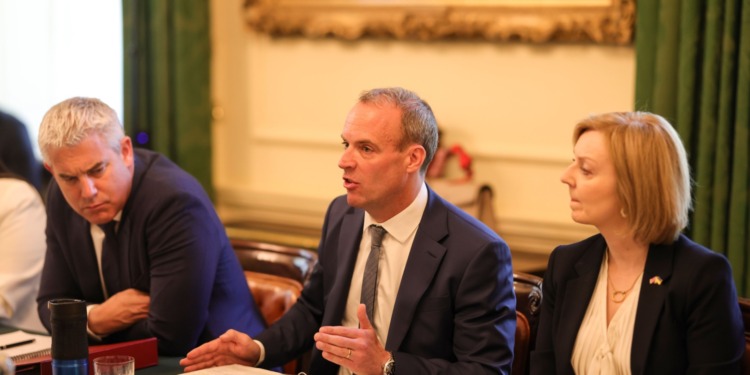The UK’s justice secretary Dominic Raab has published in parliament on Wednesday a bill of rights in a bid to replace the 1998 Human Rights Act, which enshrined the 1953 European Convention on human rights into British law.
The move is meant to ascertain the supremacy of the UK’s domestic courts over the rulings of the Strasbourg-based European Court of Human Rights (ECHR), which adjudicates on the convention. Though the bill does not call for a withdrawal from the ECHR, it seeks to ensure the UK’s parliament and courts are no longer bound by the ECHR’s “interim measures” in their respective legislative and judicial functions.
So, while individuals and organizations will still be able to appeal to Strasbourg, Britain’s domestic courts and the parliament will be free to dismiss the rulings emanating from the European court.
“We will be making it crystal clear,” said Raab, “that parliament has the last word when it comes to the legislative function and the Supreme Court has the last word when it comes to the judicial function.”
“We will be very clear that UK courts will not need to take into account case law from Strasbourg and they are explicitly free to diverge from it,” Raab added.
The publishing of the bill follows last week’s events when a last-minute interim injunction from the ECHR ordered the grounding of a flight scheduled to deport asylum seekers from Britain to Rwanda.
The measure had found that the UK’s deportation scheme put the asylum applicants at “a real risk of irreversible harm,” ruling that the Home Office should not fly any asylum seeker to Rwanda until domestic courts issue their final decision on the legality of the new policy next month.
The intervention was met with outrage by members of the ruling Conservative party, who interpret the event as an overreach and a denial of Britain’s sovereignty by a European body – although the ECHR is independent of the European Union Britain left in 2016.
Though the British government assures the bill is meant to enhance “a long and proud tradition of freedom” against the interferences of Strasbourg, organisations and legal experts, including Human Rights Watch, The Law Society, and End Violence Against Women (EVAW), have come forward to flag the bill as an act of political expediency whose goal is to sidestep international rule of law.
Ultimately, they warn, this will diminish citizens’ rights to protection and justice, particularly the ones most vulnerable to violence and discrimination, including at the hands of the state itself.
“The erosion of accountability trumpeted by the justice secretary signals a deepening of the government’s disregard for the checks and balances that underpin the rule of law,” said Stephanie Boyce, the president of The Law Society.
I. Stephanie Boyce @LawSocPresident responds to the announcement of measures to be included in the forthcoming #BillOfRights 1/6 pic.twitter.com/GkUEbla8VU
— The Law Society (@TheLawSociety) June 22, 2022
What does the British Bill of Rights say, and should we be concerned?
The bill of rights aims at empowering parliament to affirm its supremacy in the making of law when facing an “adverse Strasbourg judgement” against the UK.
It also seeks to make the Supreme Court “the ultimate judicial arbiter” with regards to the application of human rights “in a UK context.” Essentially, the bill shuns the European Court of Human Rights as a foreign body with no authority to implement its rulings on British territory – and beyond.
The bill indeed includes a bar on the application of Strasbourg rulings for military operations overseas, raising fears over prospects of accountability for abuses committed abroad by British troops.
This clause is all the more disturbing with regards to the resurfacing in October last year of a 10-years-old case involving a British soldier accused of murdering Agnes Wanjiru in Nanyuki, Kenya, where a British training base is located.
For decades, locals have denounced the British troops’ behaviour, saying they are treated “like animals.” To this day, the family of Agnes Wanjiru is still waiting for justice and accuses the British military of protecting the alleged perpetrator, who lives free in the UK.
The bill of rights will also seek to “make it more difficult for foreign criminals to use Article 8 [of the convention] to appeal their deportation.”

Article 8 of the convention of human rights enshrines every individual’s right to family life. If the bill goes through, the “foreign criminals” eligible for deportation will be required to prove that a child or dependent would suffer “overwhelming, unavoidable harm” if they were removed.
The government presents the measure as a tool to make it more difficult for foreign criminals to avoid deportation by invoking Article 8 of the convention – which the government claims enables foreign criminals to escape deportation in 70% of cases. Maria Spurrier, the director of the civil rights advocacy group Liberty, says the figure must be a typo, and the correct number actually is 7.8%.
Who exactly is considered a foreign criminal? The legislation has evolved over the years but, contrary to what Raab and the Conservatives claim, it has not evolved to favour foreign criminals.
In 2007, the UK Borders Act implemented automatic deportation for foreign national offenders who served prison sentences of 12 months or more. Under David Cameron’s premiership, the Operation Nexus initiative enabled data-sharing between police forces and the Home Office, resulting in people convicted of minor offences or even only suspected of being involved in a crime being denied the right to remain in the UK.
But in 2016, a new offence was issued, that of “illegal working” for immigrants, which, by widening the category of what constitutes a crime for a foreign person staying in the UK, also widened the category of who is considered a “foreign criminal” and eligible for deportation.
The UK’s new immigration policy, whereby asylum seekers are to be settled and processed in Rwanda, is a continuation of this tendency to conflate “foreign criminals” with immigrants, resulting in people who have a right to claim asylum in the UK being deported for having crossed the borders illegally – which constitutes an offence.
Secondly, the motion’s elusiveness regarding what exactly is meant by “overwhelming, unavoidable harm” raises concerns. What seems to be implied is that there is an acceptable amount of harm that can be brought upon a child or dependant, which would remain insufficient to justify allowing their parent or carer to remain in the UK.
The bill goes further by enforcing systematic checks of a claimant’s past record before they are awarded damages for human rights breaches – meaning that somebody with a criminal record, for instance, will be more vulnerable to being stripped from their rights and harmed by the authorities.
The bill also plans to set up a “permission stage” during which a claimant has to prove that they have “suffered a significant disadvantage” to bring a case.
But once again, the interpretation of whatever is meant by “significant disadvantage” seems to come down to personal prejudice – an obvious obstacle to the fair application of the law.
By claiming that the bill will “restore some common sense to our justice system,” Dominic Raab and the Conservative party are essentially making the application of universal rights contingent on political preference and cultural norms. Because appeals to “common sense” were historically used to assert, among other things, that the Earth was flat, homosexuality unnatural, and people of colour not really human, one can see how “common sense” hardly stands as solid grounds for a human rights legislation.
“The bill will create an acceptable class of human rights abuses in the UK,” said Stephanie Boyce, the president of The Law Society, “by introducing a bar on claims deemed not to cause ‘significant disadvantage’.”
Related article: “Plain Wrong and Racist”: Britain’s New Migration Plans | UK Threatens to Withdraw From the Convention of Human Rights
Moreover, the bill will limit the imposition of a “positive obligation” on a public body to protect individuals’ rights. The example cited by the Ministry of Justice is “police forces having to notify gang members of threats towards them from other gangs.”
But “positive obligation” is also a protection mechanism enshrined by the Human Rights Act, which enabled victims to claim compensation after an institution had failed to protect their rights. An example would be the case won by two victims of the serial rapist John Worboys against the Metropolitan police, whose failure to take the victims seriously and carry out a proper investigation enabled the criminal to continue attacking women for years.
This particular clause led Ellie Reeves, a shadow justice minister, to call the bill of rights “an attack on women,” and the End Violence Against Women (EVAW) organisation warned groups of people who already disproportionately face human rights abuses, including at the hands of the state, will be made even more vulnerable to harm as a result of this bill.
Finally, the outlined bill of rights includes clauses about the right to a jury trial, greater protection for the press facing courts that require them to hand over sources, and a “greater weight in law” for the freedom of speech in general above the right to privacy.
However, as the director of the civil rights advocacy group Liberty Martha Spurrier explained, there is “absolutely no need to repeal the Human Rights Act to do those things. The right to jury trial? There already is one. But if you want to enshrine it, sure, go ahead, do a criminal justice bill.”
“It’s basically as bad as we feared,” she added. “It’s been sold with this disingenuous claim that it’s about parliamentary sovereignty, but the truth is it’s about sidelining judicial and parliamentary scrutiny in favour of the executive being allowed to do what they want.”
“Ripping up the Human Rights Act means the public is being stripped of its most powerful tool to challenge wrongdoing by the Government and other public bodies, said Sacha Deshmukh, Amnesty International UK’s Chief executive.”
“This is not about tinkering with rights, it’s about removing them.”
What’s next?
Despite a call from 150 organisations to allow detailed parliamentary scrutiny of the bill, the justice minister James Cartlidge said that the government did not intend to submit the bill of rights for pre-legislative review – a move that also goes against demands from parliamentary committees.
The government’s first challenge will therefore be to get the bill through the House of Commons, where Labour opposition and votes from some disagreeing Tories may block the legislation from passing.
If the bill passes in the House of Commons, it is likely to face resistance in the House of Lords. But whether overall opposition will be strong and loud enough to stop Raab’s plans remains difficult to predict.
In the long-term, implementing the bill of rights will lead to inevitable diplomatic conflict, particularly with Europe, as the UK would have (once again) demonstrated its readiness to throw away past commitments for the sake of political expediency, destroying the trust required in any international alliance.
If things get really ugly, the ECHR may even find the UK’s bill of rights to be in breach of the international obligations they subscribed to by signing the convention of human rights. In that case, Britain may be joining Russia in expulsion from the Council of Europe.
Editor’s Note: The opinions expressed here by Impakter.com columnists are their own, not those of Impakter.com — In the Featured Photo: 14/06/2022. London, United Kingdom. Deputy Prime Minister Dominic Raab speaks during the Cabinet meeting in 10 Downing Street. Featured Photo Credit: Simon Dawson / No 10 Downing Street.










